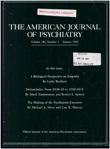The prognostic significance of obsessive-compulsive symptoms in schizophrenia
Abstract
Obsessive-compulsive symptomatology has been described in schizophrenia for more than 60 years, but its clinical significance has yet to be explored systematically. This report details the clinical characteristics and long-term course of a group of 21 schizophrenic patients with prominent obsessive-compulsive symptoms from the Chestnut Lodge Follow-Up Study. While this group differed on admission only minimally from schizophrenic patients without obsessive-compulsive symptoms, their long-term outcome in the areas of social relations, employment, psychopathology, and global functioning was significantly, and almost uniformly, poorer. Persistent obsessive-compulsive symptoms thus appear to be a powerful predictor of poor prognosis in schizophrenia.
Access content
To read the fulltext, please use one of the options below to sign in or purchase access.- Personal login
- Institutional Login
- Sign in via OpenAthens
- Register for access
-
Please login/register if you wish to pair your device and check access availability.
Not a subscriber?
PsychiatryOnline subscription options offer access to the DSM-5 library, books, journals, CME, and patient resources. This all-in-one virtual library provides psychiatrists and mental health professionals with key resources for diagnosis, treatment, research, and professional development.
Need more help? PsychiatryOnline Customer Service may be reached by emailing [email protected] or by calling 800-368-5777 (in the U.S.) or 703-907-7322 (outside the U.S.).



